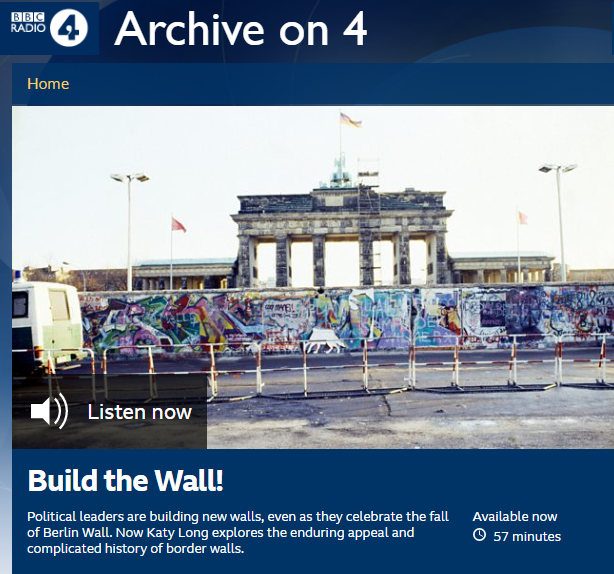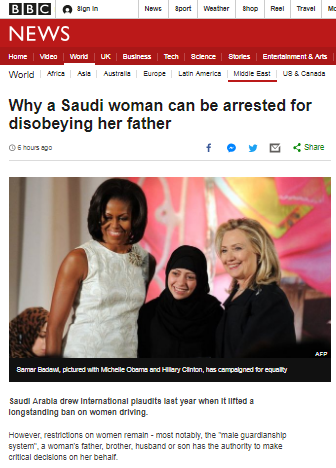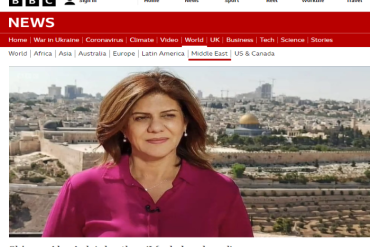On January 3rd BBC Radio 4’s ‘Archive on 4’ re-ran an hour-long programme first aired in November 2019 under the title “Build the Wall!”.
“On the 30th anniversary of the fall of the Berlin Wall, Katy Long asks why political leaders are celebrating the occasion while building new border walls of their own.
From the United States, where ‘build the wall’ has become a symbol of the Trump presidency, to Norway, India and South Africa, dozens of walls have gone up since 1989, with many more being built, planned or imagined. In this programme, Katy tells the modern history of border walls to ask why they are being built, and why now, when new virtual technologies increasingly offer alternatives to concrete barriers.
Katy will examine the complicated history of the Berlin Wall, and what it meant during the Cold War. She’ll examine border walls and border communities in Northern Ireland, the United States, South Africa and Israel, exploring what happens when walls are built – for good and ill – and whether it’s possible to take them down again. She’ll look at the difference between walls to keep people in, and keep them out, and whether the walls are really about safety, or certainty, or just about ‘us’ and ‘them’.”
Katy Long is not a BBC journalist. As readers may know, the BBC’s editorial guidelines state that:
“4.3.12 We should not automatically assume that contributors from other organisations (such as academics, journalists, researchers and representatives of charities and think-tanks) are unbiased. Appropriate information about their affiliations, funding and particular viewpoints should be made available to the audience, when relevant to the context.”
BBC audiences however are told nothing of Long’s affiliations and hear nothing about the “funding and particular viewpoints” of the think tank for which she works.
According to its webpage, the BBC Radio 4 programme will be available “for over a year” and so the substantial section relating to Israel – which begins at 43:55 – is worthy of examination. [emphasis in italics in the original, emphasis in bold added]
Long: “And the closer I look the more it seems like border walls run along the hidden fault lines of our liberal democracies. They’re monuments of the political impossibility of balancing national sovereignty with ideas of universal freedom, human rights and equality. That’s certainly the case of Israel – a state that is now almost entirely surrounded by walls. Danny Tirza.”
Tirza: “In 2000 the government decided to construct a security barrier between the West Bank and Israel and that was the project that I was the head of.”
Israel is of course not “entirely surrounded by walls” – in most places the border is protected by a fence. Long began by casting doubt on the information her interviewee had yet to provide.
Long: “For Tirza, the architect of the West Bank security fence, the logic of the barrier is simple and can be measured in the number of Israeli lives he believes it has saved.”
Tirza: “From 2000 till the end of 2006 we had in Israel more than three thousand terror attacks. We lost in this period 1,562 people that were murdered by terror attacks from the West Bank to Israel. At that period we had from Gaza Strip only three terror attacks because Gaza Strip was already fenced before that. But from January 2007 till today we had from the West Bank to Israel only 50 terror attacks and we lost in this period 41 people. You can see the differences.”
Long proceeded to signpost that information from a contributor – who is the former head of the Strategic Planning Unit of the Judea and Samaria Division, IDF Central Command (1994-2009), a former senior security adviser and negotiator in diplomatic talks with the Palestinian leadership and a former advisor to prime ministers, the president of Israel, defense ministers, the National Security Council, the Counter-Terrorism Bureau, the IDF Planning Branch, and senior IDF commanders – as unreliable. She did not inform listeners by whom that information is “contested” or whether that claim has any merit.
Long: “The exact numbers here are contested and correlation is not always causation. But what is beyond dispute is that there’s been a dramatic drop in Israeli deaths from terrorism since the barrier was built. But from the other side of the wall, the story looks very different.”
The contributor chosen to present the view from “the other side of the wall” is a London-based Iranian-American academic whose frankly often ridiculous claims did not receive any questioning, challenge or signposting from Katy Long.
Khalili: “This wall functions more as an offensive measure rather than as a defensive one.”
Long: “Laleh Khalili is professor in Middle East politics at the School of Oriental and African Studies at the University of London.”
Khalili: “So what do I mean by this? I mean that it has a certain series of functions that are used to control populations. Not only are you controlling people’s movements but you’re also by cutting the territory into different segments – and I think that in part explains the shape of the wall in the West Bank – what you’re doing is you’re creating areas with variegated modes of military control in them so that people can be subjected to surveillance in those spaces, they can be subjected to control of movement but also, should there be for example demonstrations or protests or forms of mobilization, the wall actually functions as a military means to limit those protests. And the third function is land grab so some of the areas where we see the wall have really – the wall in the West Bank – have some really very odd contours. In those instances the wall actually functions as a kind of a means to grab a bit of land and annex it.”
Those claims are of course complete nonsense but listeners heard no challenge from Long, who went on to promote an inaccurate claim of her own.
Long: “The West Bank’s wall sits to the east of the pre-1967 borders meaning that about 10% of the West Bank is now on the Israeli side of the barrier and some Palestinian villages are entirely encircled by the fence.”
There is of course no such thing as “pre-1967 borders”: as the BBC’s own style guide recognises, the 1949 Armistice Line is not a border.
“In describing the situation on the ground, take care to use precise and accurate terminology. The Green Line is a dividing line or a boundary. If you call it a border you may inadvertently imply that it has internationally recognised status, which it does not currently have.”
Moreover, Long’s claim that all of the anti-terrorist fence “sits to the east” of what she wrongly described as a border is untrue. She went on to promote pure conjecture as fact.
Long: “This means that while the wall may have brought Israel temporary security, it will make negotiations for a lasting peace still more complicated.”
Tirza: “No, this line is not a border. The border had to be decided only on the table of the negotiation. So the line will change there because there are other concerns that we can deal with on the negotiation table. That’s not that line.”
Long: “How permanent are those walls?”
Tirza: “As I was the territorial expert in all the negotiations with the Palestinians, I want to be the one that will take off the fences around the West Bank. I love this area very much. I have so many friends on the other side so really I hope that they will come and there will be no need for the security fence and we can remove it and live normally and quietly with our neighbours the Palestinians.”
Long: “I was reading as I was preparing for this that on some of the concrete slabs there are holes at the top. Is that right?”
Tirza: “That’s right. We call it the hole of hope. That it will be very easy to come with a crane and to take it off and remove it.”
Listeners then heard a recording, apparently from a news report, followed by the repetition of the false claim that Israel is “encircled with walls”:
“It’s a project shrouded in secrecy and there are plenty of denials today that this barrier is even being built.”
Long: “But despite Tirza’s hope that one day, when there is peace, the walls in the West Bank can come down, Israel is still building new barriers. Today the entire state is encircled with walls physically reinforcing the sense of the state existing under siege – a sense which has informed so much of Israeli politics in recent years.”
BBC audiences did not get to hear anything about the relevant issues of ISIS in the Sinai, Iranian-backed terror groups in the Gaza Strip or the terror group Hizballah in Lebanon and the Syrian Golan at that point or any other in the programme.
Apparently confusing the border with Egypt with that of the Gaza Strip – and making absolutely no mention of cross-border attack tunnels – Long went on:
Long: “On the border with Egypt a new barrier is being built. Not just up but also down underground, as Christian Fraser reported.”
The recording of Fraser’s report continued:
Fraser: “Sources say the new barrier is made of super strength steel that extends 80 meters below the surface. They believe it is manufactured in the United States. From descriptions it appears to fit together like a jigsaw and they say it’s been tested to ensure it’s bomb proof, it can’t be cut, it can’t be melted. In short, it sounds almost impenetrable.”
Long: “Ultimately, so much depends on where you’re standing when you look at Israel’s walls. For Israelis the fences are tolerable, even welcome, because they are held to keep terror out and because for most Israelis they are out of sight, out of mind.”
What evidence Long has to support that dubious claim is unclear. She went on:
Long: “For Palestinians, especially in overcrowded Gaza where nearly 2 million people live on just 350 square kilometers of land, they are hated as an assault on basic freedom because the walls limit everyday lives by keeping people in. Laleh Khalili explains.”
Khalili: “In Gaza the wall is so all-encompassing, in some ways so incredibly difficult to penetrate, that in fact it acts as a kind of a very large-scale prison. People often use that terminology to define…to describe Gaza as a large open-air prison but in fact the walls that surround it, at least on the land side, feels like anybody who’s in Gaza is stuck there.”
That ‘open air prison’ propaganda got no challenge from Long and listeners were not told that the Gaza Strip has a land border with Egypt or that thousands of people travel out of the territory every month. Of course the crucially relevant topic of the terrorism perpetrated by factions in the Gaza Strip did not even get one word of mention.
Long then joined some agenda-revealing dots for her listeners.
Long: “It’s tempting, standing here on the US border with Mexico, to talk about the many links between the barriers in Israel and the increased border enforcements here under President Trump. To point to the Israeli companies competing for contracts or the advice that Danny Tirza has given to the US Sheriff’s Association. To think about the increasing militarisation of this border between allies.”
As we see, the BBC is apparently quite happy for a programme which includes numerous inaccuracies to remain available on its platform for “over a year”.
Related Articles:
Does BBC reporting on Israel’s anti-terrorist fence meet standards of ‘due impartiality’? – part 3
BBC WS programme on anti-terrorist fence promotes inaccurate information




